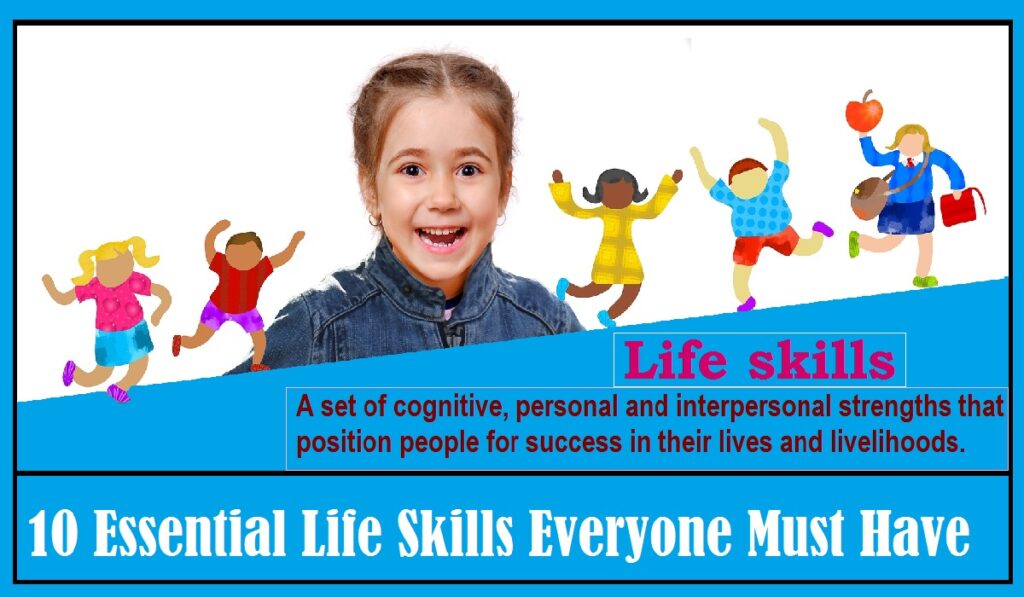Having basic life skills bridges the gap between knowledge acquisition and the ability to apply, helps in dealing with the challenges of daily life in a good way and enhances the individual’s ability to meet the needs and demands of modern society.
There are many life skills that a person can learn; however, everyone must have these top 10 essential life skills for their better life.

10 Basic Life Skills Everyone Needs in Life
What are Life Skills?
The term “life skills” is usually used for any of the skills needed to deal effectively with life’s challenges. These skills vary according to a person’s priorities, way of life, and the environment around him.
Life skills are personal, psychological and social skills that an individual acquires through making mistakes or learning things before making mistakes, so that he can live more confidently and with high capacity, and have the skills that qualify him to improve his life chances and make good decisions in building his future.
Life skills enhance the well-being of young people and help them develop themselves as active and productive actors in their societies.
Do you have the basic life skills to be a successful person? If your answer is “no,” then you need to learn more about life skills and in order to deal with others positively and in a smooth manner and enjoy your personal life and live more confidently.
People who have better life skills are able to better deal with emergency changes and crises. So it is necessary to pay attention to developing skills and take advantage of all the consequences that stand in our lives.
Developing new skills depends mainly on determining the motivating goal for acquiring this skill. This is done by thinking about the reason for learning this skill, and what he will do with it after acquiring it. This helps to retain the skill for as long as possible.
Also, having the ambition to achieve a specific goal is the main motivation to reach it. And after determining the desired goal, it is imperative to study all the elements that help to reach it, and start working on them gradually.
Why Do We Need to Learn Basic Life Skills?
The development of life skills is very important in every person’s life as it helps us to find new ways of thinking and solving problems, build self-confidence and self-esteem and recognize the impact of our actions and it teaches us how to take responsibility for what we do rather than blame others.
Having essential life skills bridges the gap between basic functioning and capabilities, helps in dealing with the challenges of daily life in a good way, and enhances the individual’s ability to meet the needs and demands of the present society.
The goals and objectives of life skills education: There are many goals that are achieved through mastering life skills, including:
- Developing the personal characteristics of the learner.
- Improving psychological and social life.
- Developing self-learning skills.
- Establishing good social relationships.
- Developing informed observation.
- Identifying the skills that make your life easier, such as problem-solving.
- Gaining creative thinking skills and sound critical skills.
- Developing the ability to take the right decision at the right time.
- Focusing on sources of energy and conservation.
- Developing the skill of the ability to invest time and make use of it.
- Learning about modern technologies.
10 Core Life Skills You Need to Learn and Master
There are many skills that a person acquires throughout his life to effectively deal with the demands and challenges of daily life; however, everyone must learn these top 10 essential life skills for their better life.
1. Interpersonal Skills
Interpersonal skills are the basic life skills we need to help maintain a healthy body and mind. These skills include many of those on the World Health Organization (WHO) list such as (flexibility, self-control and self-awareness), and also include skills such as how to recognize, manage and deal with emotions.
The ability to manage anger and stress can also be basic life skills. Identifying anger and stress, and recognizing what may trigger them, can be an effective way to prevent them, greatly improve the quality of life, take advantage of the energy wasted in anger and turn it into positive things.
In this way, you will not only overcome the bad habits in your personality but also turn them into a new positive energy that enables you to learn something new or practice an action that benefits you.
2. Communication Skills
Communication skills are the abilities you use when transmitting a message, information, instructions, opinion, feedback, or even gossip.
We use communication skills to make connections with others, and therefore they are an important part of what makes us human.
Communication skills are generally seen as a subset of interpersonal skills just as much as decision-making and problem-solving, but both are important enough to consider as well.
Interpersonal and communication skills cover a wide range of skills, including:
- Active listening skills, combined with clarification and reflection techniques, can help prevent misunderstanding.
- Verbal and nonverbal skills, which include both how to use your voice and choose the right words, as well as using tone of voice and body language, because this enables you to help build a relationship.
3. Reading and Writing Skills
Most people today communicate using the written word through text messages, modern means of communication, and a host of other ways.
The ability to write clearly and precisely is a very powerful way to communicate, whether on an individual basis or with a larger audience.
So try to acquire writing skills and look for means that help you learn in the way that you accept in order to improve that skill and be able to express your inner thoughts better.
4. Mathematical Skills
Mathematical skills can be defined as the ability to perform mathematical tasks and to effectively solve given numerical problems.
Many people struggle with math or arithmetic, yet developing or updating your math skills can give you a real boost in life.
Mathematical skills have a number of very useful benefits to your life, including:
- Better math skills can make you more employable.
- Make your life orderly and prevent chaos.
- Help have better problem-solving skills.
- Save your time and money.
- Help you develop a better understanding of the world around you.
- Improve your mental health.
- Help think analytically and have better reasoning abilities.
5. Problem-Solving Skills
Problem-solving consists of defining a problem, identifying the cause of the problem, and using generic or ad hoc methods in an orderly manner to find solutions to problems.
Problem-solving skills allow you to control your environment and adapt to the surrounding conditions, discover the root cause of a challenge or problem and provide a great deal of satisfaction and achievement.
Throughout a person’s life they will encounter many obstacles that they must face and overcome, so learning how to solve problems can help you:
- Test your ability to analyze information and assess situations.
- Identify things that could be changed or improved.
- Develop approaches and alternatives to influence change.
- Make decisions about which alternative to select.
- Apply mathematical knowledge to solve hypothetical and real-world problems.
- Devise new strategies to overcome a problem.
- Boost your self-esteem and your ability levels.
6. Self-Awareness Skills
Self-awareness refers to your ability to recognize or perceive your emotions, beliefs, behaviors, and motivations, among other characteristics including your strengths and weaknesses.
Self-awareness is a crucial life skill, as it gives you a better knowledge of who you are, how you experience yourself, and what makes you unique and different from other individuals.
Once you become self-aware, you will be able to make lifestyle changes that help you think more positively.
Some of the main benefits you can gain from self-awareness include:
- Being mindful of your strengths and weaknesses.
- Recognizing your emotional triggers.
- Enriching emotional intelligence.
- Enhancing communication skills.
- Increasing active listening and empathy skills.
- Enhancing leadership capabilities.
- Keeping your mind open and staying focused.
7. Time Management Skills
Time management is the process of organizing and planning how to use your time productively and efficiently.
Good time management allows you to achieve more in a shorter time frame, which leads to more free time.
So knowing how to work well under pressure and being able to focus and stay organized can reduce stress levels and keep you on the right track.
There are several time management tips that can help you. Try some of these techniques to improve time management skills:
- Set goals correctly.
- Set a time limit to complete a task.
- Schedule your tasks and deadlines.
- Prioritize your tasks.
- Use a to-do-list, but don’t abandon tasks.
- Remove non-essential tasks/activities.
- Take a break between tasks.
- Learn your patterns of productivity.
8. Leadership Skills
Leadership skills are the strengths and abilities you use to oversee processes, guide initiatives, steer your employees toward the achievement of goals, or organize other people to reach a shared goal.
Understanding the power and value of leadership is a very important skill in life, as it can have a huge impact on your life and the lives of others as well.
A leader not only takes control but also knows how to motivate, inspire and empower others.
To be a successful leader, you need to see the best in those around you and teach them to believe in their worth.
Leadership can benefit every area of your life and help:
- Increase the ability to attract and retain talent.
- Strengthen communication skills.
- Improve the ability to succeed under pressure.
- Make better decisions and set clear goals.
- Boost self-confidence.
9. Refusal Skills: Ways to Say “No!”
One of the skills that little is known about, as saying the word “no” is a great burden for some people and they feel upset because of their inability to say it, even though they need to object or not accept the matter. Therefore it is a good life skill that helps the owner enjoy life better.
It is necessary for a person to learn how to say the word “no” in a decent manner without feeling ashamed, and without disturbing the other party as well.
The individual must learn and understand that there are some things that should be prioritized, including (health, time, life, family. ).
For a teenager, refusal skills can greatly help one’s life. The fact that one has the ability to say “no” to certain things like risky situations and unwanted sexual advances.
Here are some effective ways for you to say ‘NO’ in a polite manner:
- No, thank you but it sounds lovely, so next time.
- I’m honored but I can’t.
- Sorry, I’m booked into something else right now.
- Sadly, I have something else.
- I wish there were two of me.
- I’m not taking anything else right now.
- Let me think about it.
- No thanks, I won’t be able to make it.
10. How to Say Sorry: The Skills of Apology
There are a number of people who do not know how to apologize sincerely for their mistakes. So the skill of sincerely apologizing is one of the most important life skills that a person needs throughout his life. Because all human beings make mistakes and are in constant need to apologize for their actions that may cause harm to others.
A successful apology strategy includes some important steps, including:
- Go ahead first to apologize.
- Let people know that you realize you hurt them.
- Express remorse over your actions.
- Don’t make assumptions and don’t try to shift the blame.
- Prove you mean you are sorry.
- Offer to make amends.
- Formally ask them for forgiveness.
- Promise that it won’t happen again.
Conclusion:
Life skills are any abilities for adaptive and positive behavior you need to effectively handle the activities and challenges that you commonly encounter in daily life.
The basic life skills mentioned above can enhance your way of thinking, help you deal effectively with the events and challenges of everyday life, build confidence in your personal and professional endeavors and improve your quality of life.





